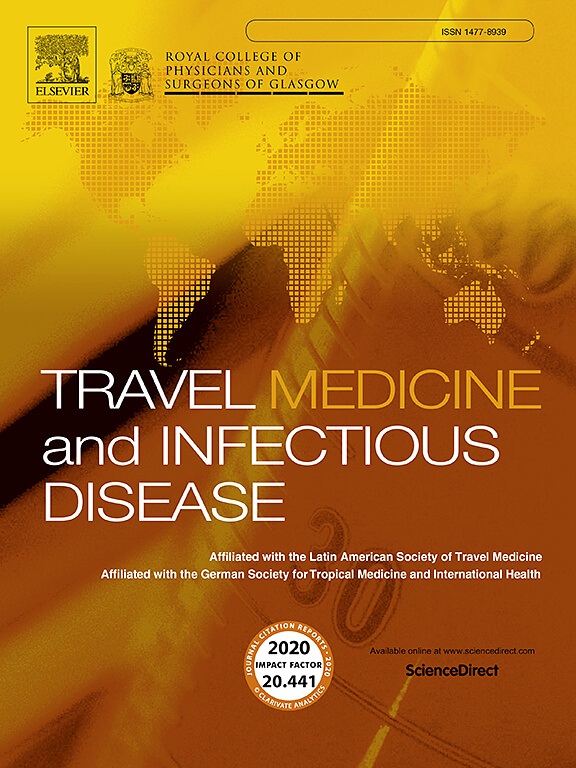The impact of climate change on travel-related vector-borne diseases: A case study on dengue virus transmission
IF 4.7
3区 医学
Q1 INFECTIOUS DISEASES
引用次数: 0
Abstract
Introduction
Climate change significantly affects global health, particularly through the increased transmission of vector-borne diseases like dengue fever. This study examines how climate change influences the geographical spread of Aedes aegypti mosquitoes, the main carriers of dengue, highlighting its implications for public health worldwide.
Materials and methods
This study employed a comprehensive approach to evaluate the effect of climate change on dengue transmission dynamics. It included environmental data analysis, mosquito population surveys, and dengue case reports. Remote sensing data was used to track changes in temperature, precipitation, and humidity in dengue-prone areas. Field surveys measured mosquito density, while molecular techniques assessed viral load in Aedes mosquitoes. Additionally, mathematical modeling predicted dengue's future spread under various climate scenarios.
Results
The findings indicate a significant correlation between rising temperatures, changing rainfall patterns, and the expansion of Aedes aegypti habitats, resulting in increased mosquito populations in previously non-endemic areas. This ecological shift is linked to a rise in dengue incidence in regions affected by climate change. Projections suggest a 25 % increase in dengue spread by 2050, especially in Southeast Asia, sub-Saharan Africa, and parts of South America.
Discussion
The study highlights the significant effects of climate change on mosquito distribution and the increasing rates of dengue fever. Warmer temperatures and altered rainfall patterns enhance mosquito growth and virus transmission, while global travel aids the spread of the virus. It emphasizes the necessity for early intervention strategies, including better surveillance, vector control, and adaptations to climate changes, to tackle future dengue transmission issues.

气候变化对旅行相关病媒传播疾病的影响:以登革热病毒传播为例
导言:气候变化严重影响全球健康,特别是通过增加登革热等病媒传播疾病的传播。这项研究考察了气候变化如何影响登革热的主要携带者埃及伊蚊的地理传播,强调了其对全球公共卫生的影响。材料和方法:本研究采用综合方法评估气候变化对登革热传播动态的影响。它包括环境数据分析、蚊子种群调查和登革热病例报告。遥感数据用于跟踪登革热易发地区的温度、降水和湿度变化。实地调查测量了蚊子密度,而分子技术评估了伊蚊的病毒载量。此外,数学模型预测了登革热在各种气候情景下的未来传播。结果:研究结果表明,气温上升、降雨模式变化与埃及伊蚊栖息地扩大之间存在显著相关性,导致以前非流行地区的蚊子数量增加。这种生态转变与受气候变化影响地区登革热发病率上升有关。预测表明,到2050年登革热传播将增加25%,特别是在东南亚、撒哈拉以南非洲和南美洲部分地区。讨论:这项研究强调了气候变化对蚊子分布和登革热发病率上升的显著影响。气温升高和降雨模式改变促进了蚊子的生长和病毒的传播,而全球旅行则助长了病毒的传播。报告强调需要采取早期干预战略,包括更好的监测、病媒控制和适应气候变化,以解决未来的登革热传播问题。
本文章由计算机程序翻译,如有差异,请以英文原文为准。
求助全文
约1分钟内获得全文
求助全文
来源期刊

Travel Medicine and Infectious Disease
PUBLIC, ENVIRONMENTAL & OCCUPATIONAL HEALTH-INFECTIOUS DISEASES
CiteScore
19.40
自引率
1.70%
发文量
211
审稿时长
49 days
期刊介绍:
Travel Medicine and Infectious Disease
Publication Scope:
Publishes original papers, reviews, and consensus papers
Primary theme: infectious disease in the context of travel medicine
Focus Areas:
Epidemiology and surveillance of travel-related illness
Prevention and treatment of travel-associated infections
Malaria prevention and treatment
Travellers' diarrhoea
Infections associated with mass gatherings
Migration-related infections
Vaccines and vaccine-preventable disease
Global policy/regulations for disease prevention and control
Practical clinical issues for travel and tropical medicine practitioners
Coverage:
Addresses areas of controversy and debate in travel medicine
Aims to inform guidelines and policy pertinent to travel medicine and the prevention of infectious disease
Publication Features:
Offers a fast peer-review process
Provides early online publication of accepted manuscripts
Aims to publish cutting-edge papers
 求助内容:
求助内容: 应助结果提醒方式:
应助结果提醒方式:


